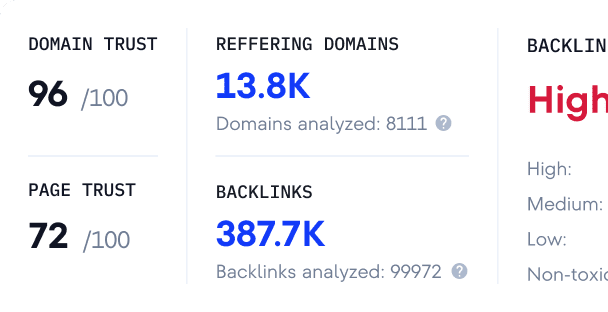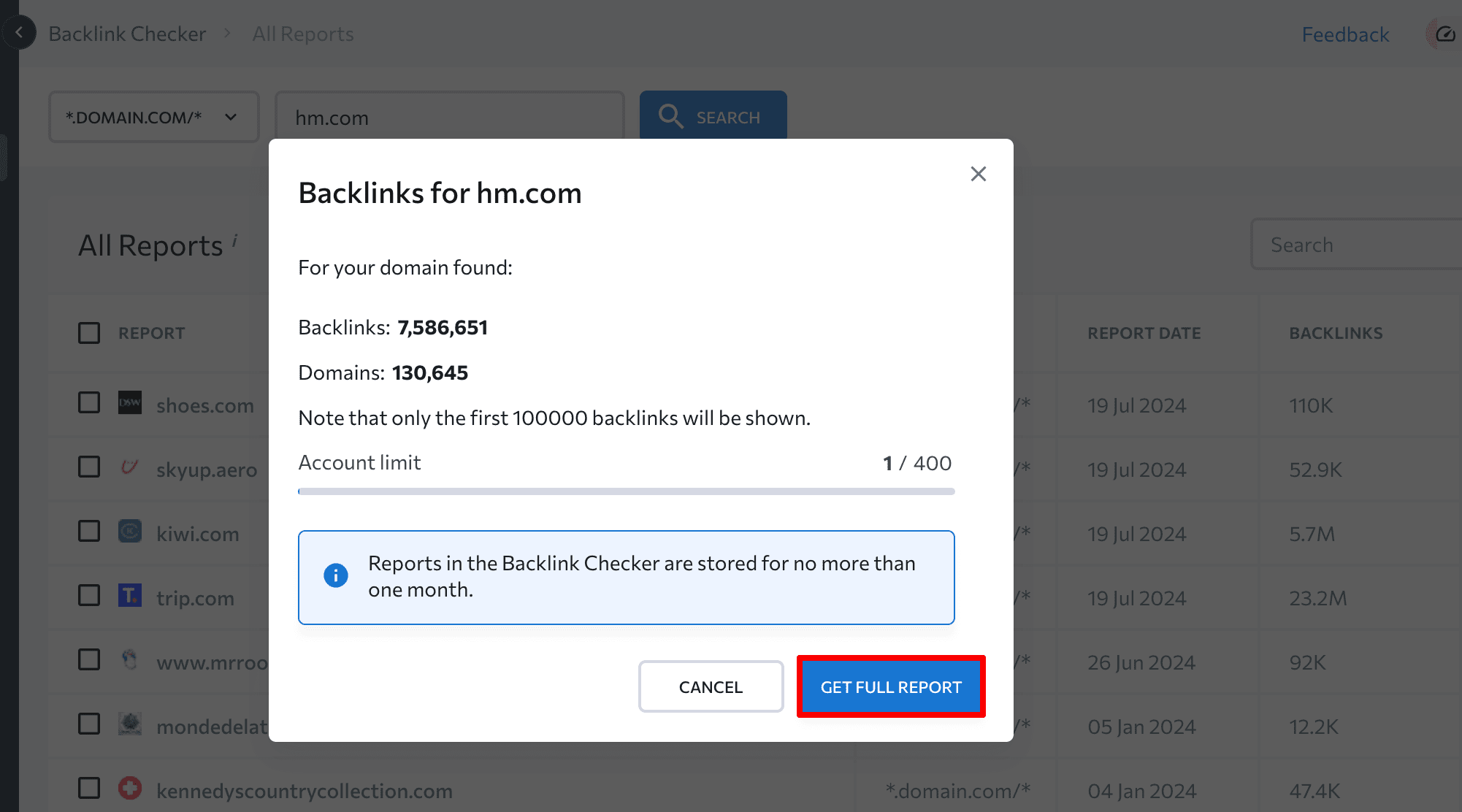What Anchor Text is and What You Should Know About It
-
Anchor text is the clickable text in a hyperlink, helping users and search engines understand the content of the linked page.
-
Effective use of anchor texts can improve a page’s ranking, while overusing exact-match keywords can lead to penalties.
-
To improve your SEO, ensure your anchor texts are natural, relevant, and not repetitive. Balance different types of anchor texts and create a plan that aligns with your website’s goals.
-
Regularly analyze your anchor texts and backlink profile to ensure compliance with SEO best practices. Use tools like SE Ranking’s Backlink Analyzer to track and adjust your strategy.
-
Proper use of anchor texts within internal links helps create a strong network of connections on your website, enhancing user experience and boosting SEO by signaling content relevance to search engines.
In the modern SEO landscape, backlinks are a hot commodity. Everyone knows that they are a crucial ranking factor, but some backlink parts are often overlooked. This article is dedicated to anchor texts, which are among those overlooked parts. We’ll dive deeper into the best ways to work with anchor texts. We’ll also look at why link texts are essential for SEO.
But what are their types? How can you create a quality anchor text for your backlink? Look no further than here to find answers to these and many more questions.
Let’s begin with the basics 👇
What is an anchor text, and what does it look like?
Anchor text (or link text) is the visible, clickable text of a link. It’s the description of a page being linked. It’s also technically part of a link because it’s an <a> element of an HTML page.
Here’s an example that clearly shows HTML formatting for a link text:

Anchor text usually appears in a different color than the surrounding text to make it clear for users that they can click on it. This is what it looks like on a page:
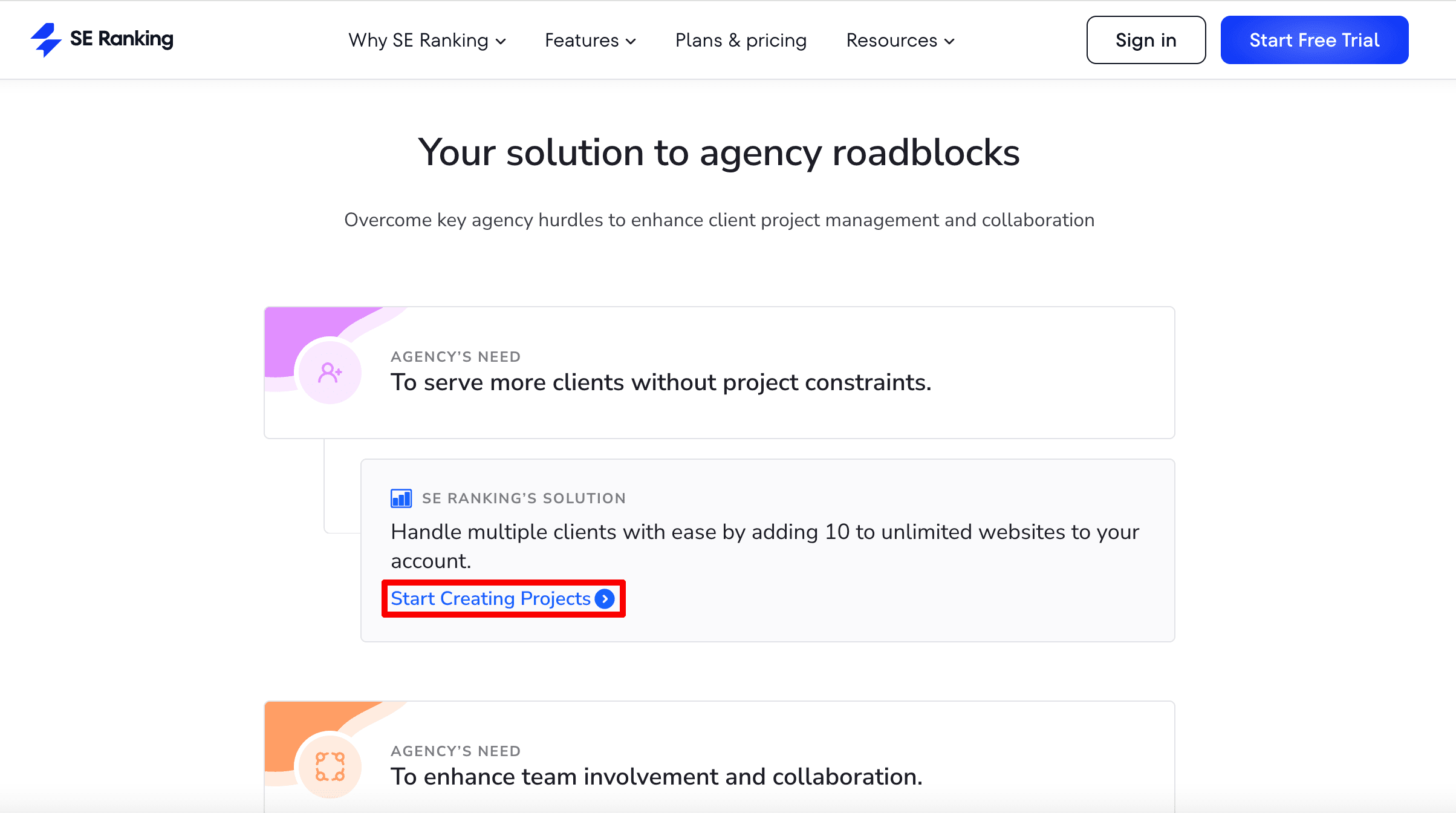
While anchor text is a vital part of any link (both internal and external), let’s look deeper into backlink anchor texts. After all, inbound links are one of the main ranking factors. Read our handy guide if you want to know more about backlinks and why they are crucial for successful SEO.
Types of anchor text
The list below presents and illustrates the most common types of texts for backlinks. You might see different namings for these anchor text types but the general idea remains the same.
- Branded. These are the links attached to a brand name mentioned in the text. They look this way:
- Domain or URL anchor texts. These anchor text types present links to other pages in an uncreative way. They’re also called naked links. Something like the link below would be a perfect example:
- Exact-match keywords or keyword-rich anchor text. These are anchor texts that contain the main keywords related to the URL being linked to. These anchor texts are typically called commercial anchor texts. Take a look at the examples below for reference:
SEO software, Google rank checker, or competitor analysis tool
- Partially matching keywords. These are anchor texts that may combine branded text with a keyword or partially contain your keyword. The text below is a perfect example:
SEO software from SE Ranking or SE Ranking’s site audit tool
- Related keywords. This is when a related or long-tail keyword serves as the anchor text for a particular link. For example:
Link building guide for beginners
- Page title. Sometimes, the link is connected to the page’s name to which it leads. This is used most often by websites that add links automatically. For instance:
Competitor Website Analysis Tool: Get SEO and PPC Insights
- Generic links. These are links that provide little-to-no context to the page visitor or crawlers. They are very simple and involve attaching the link to generic phrases like:
continue reading or learn more
- Images. When an image is clickable and used as a link, its alt text functions as its anchor text. Here’s what this HTML code looks like:
<a href=”https://seranking.com/blog/link-building/”><img src=”https://website.com/assets/questions/media/426142-1668760765.png” alt=”Link building”></a>
Still, on the website, it might look like a regular image:

Why are anchor link texts important for SEO?
When we are talking about the link building process, we always emphasize that working on anchor texts is an essential part of your link building strategy. And here’s why 👇
- First, backlink anchor texts are what bring your website users to your page. It helps users understand the value of a link and what they get after clicking it. This means the referral traffic you’ll get will be more relevant.
- Second, anchor text is the mediator between the linking page and the page that is being linked to. It helps the crawler understand the link’s relevance and this way influences your website’s rankings. The way it works is quite simple. If Google recognizes that the linked article matches your keyword included in the link text, it ranks this article as material that is relevant to this keyword.
Links may be internal or external. In either of these cases, the better your anchor text is, the easier it is for users to navigate and for Google to understand what the page you’re linking to is about.
You may check out first-hand information to know what the guys from Google say about anchor texts.
How do link texts influence search engine rankings?
Google uses several techniques to shape the search results, including page rank, anchor text, and proximity information. It also uses anchor text to help it understand the context of the link.
For example, if someone inserts the link to the article behind the keyword baseball card, Google will consider this article to be about baseball cards. The more pages that use the anchor link text baseball card to reference this article, the higher this article will be in search engine rankings for this keyword. This means that using the same anchor text will increase Google’s confidence that the page in question should potentially rank for this keyword.
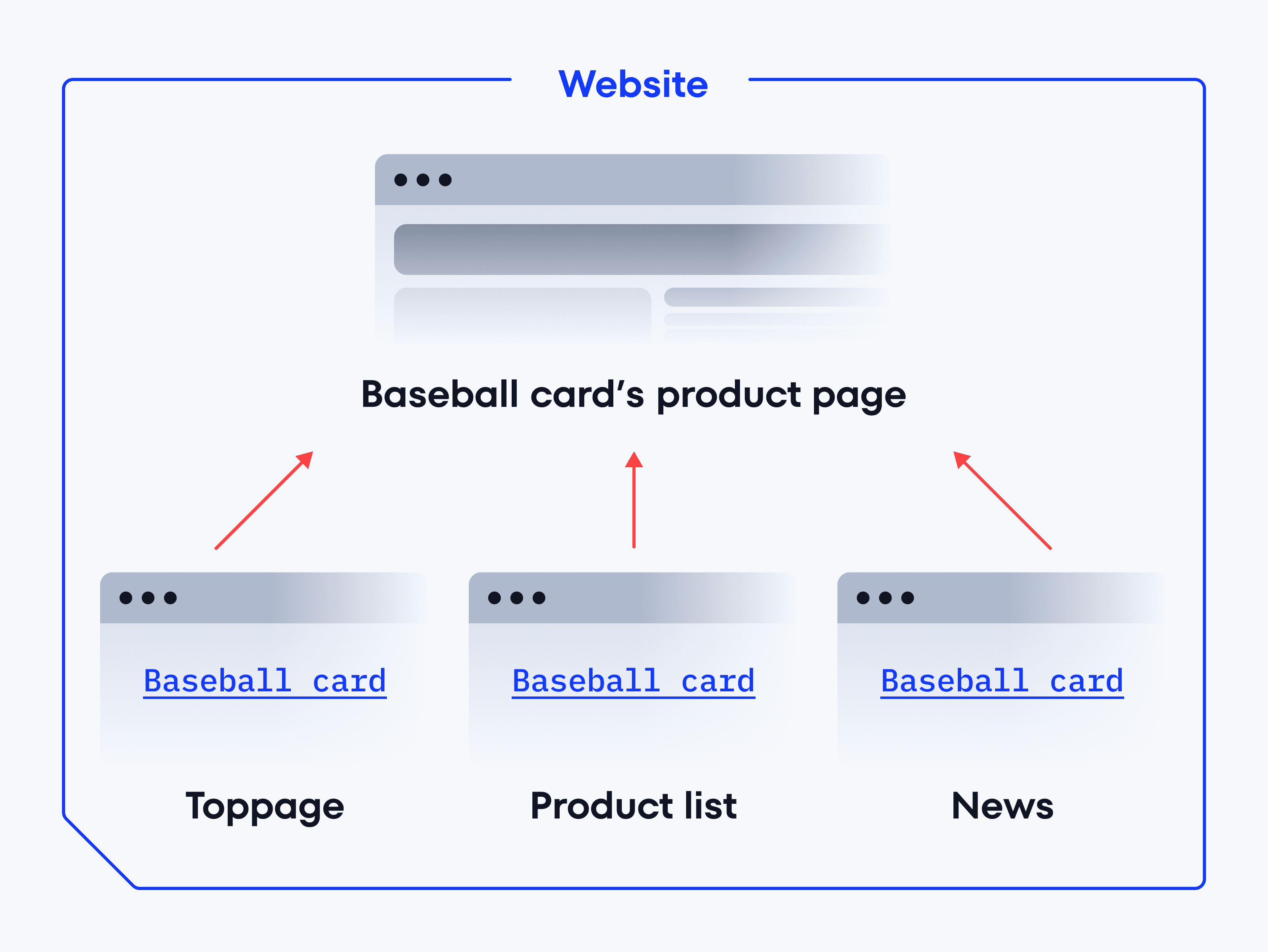
Meanwhile, repeating anchor link text too many times in your content isn’t a good idea.
You can easily monitor the impact of your anchor texts with keywords on page rankings. Use SE Ranking’s Rank Tracker to observe any improvements in your page positions for the keywords you’ve recently included in your anchors.
Mind Google’s anti-spam policies
Some SEO specialists believe that it’s best to use as many exact-match anchor texts as possible. To some extent, this makes sense. Keyword-rich anchor texts can help focus pages quickly rank for their target keywords.
However, you should bear in mind the following risk: Google’s anti-spam policies, inluding link spam, are rather strict, which is reflected in the core algorithm.
Google closely examines keywords (among other things) in link texts. If Google sees that too many of the site’s inbound links show the exact same anchor text, it starts to suspect that the links haven’t been acquired naturally. So, if you don’t want the algorithm to slash your page’s SEO rankings, be cautious with repetitive word combinations. Or at least try not to overload your content with backlinks with a high percentage of keyword-rich anchor text.
Overloading your page with exact-match keywords can cause its SEO rankings to plummet dramatically.
How do you find your or your competitors’ anchor texts?
To start working on anchor text optimization and to create or improve your anchor text plan, you first need to run a backlink analysis and find all of your anchor texts. SE Ranking’s Backlink Analyzer has all the features you need to analyze both your backlink profile or the backlinks of your competitors, including anchor texts. Use the following step by step framework for improving your anchor text plan with SE Ranking.
1. Go to the Backlinks section and click on the Backlink Checker.
2. Enter your domain name into the text field and push the Search button, and then the Get full report button.
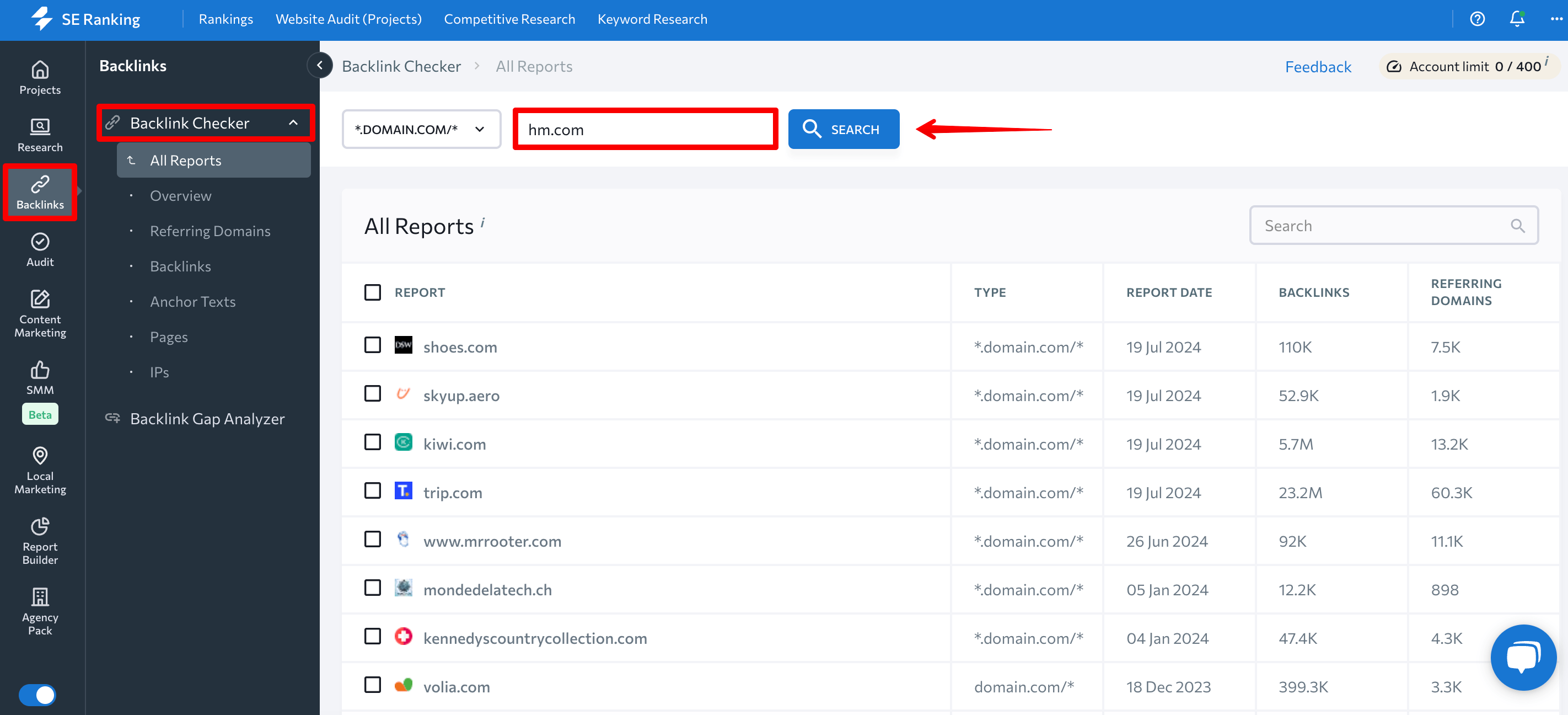
You’ll see all the key data on your website’s backlink profile, including its Domain & Page Trust scores, the number of referring domains and backlinks, the total number of unique anchor texts, toxic backlinks, and more. You can also find broken links on your website, both their total number and the complete list.
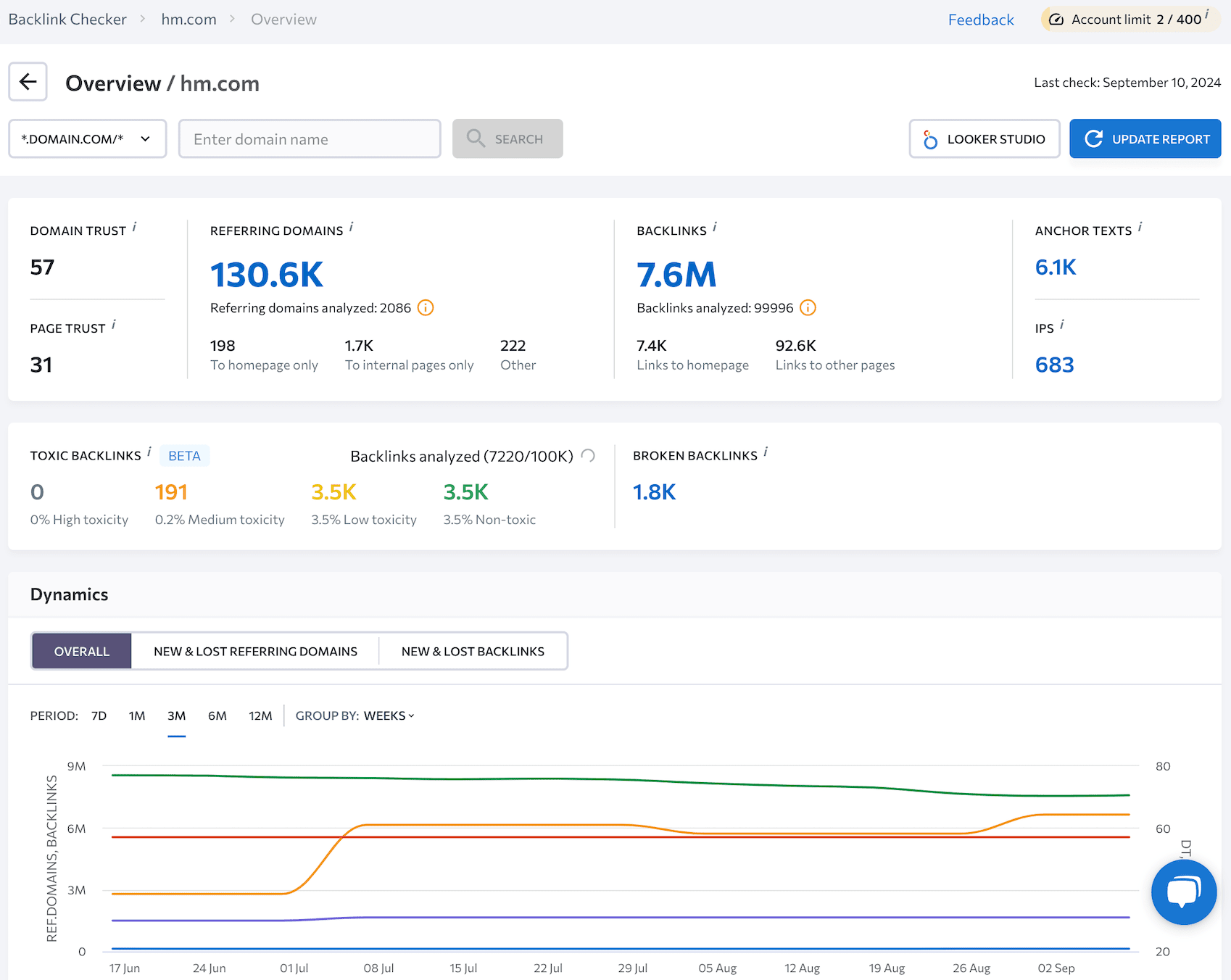
3. To see the list of all your anchor texts, go to the Anchor Texts section underneath Backlinks.
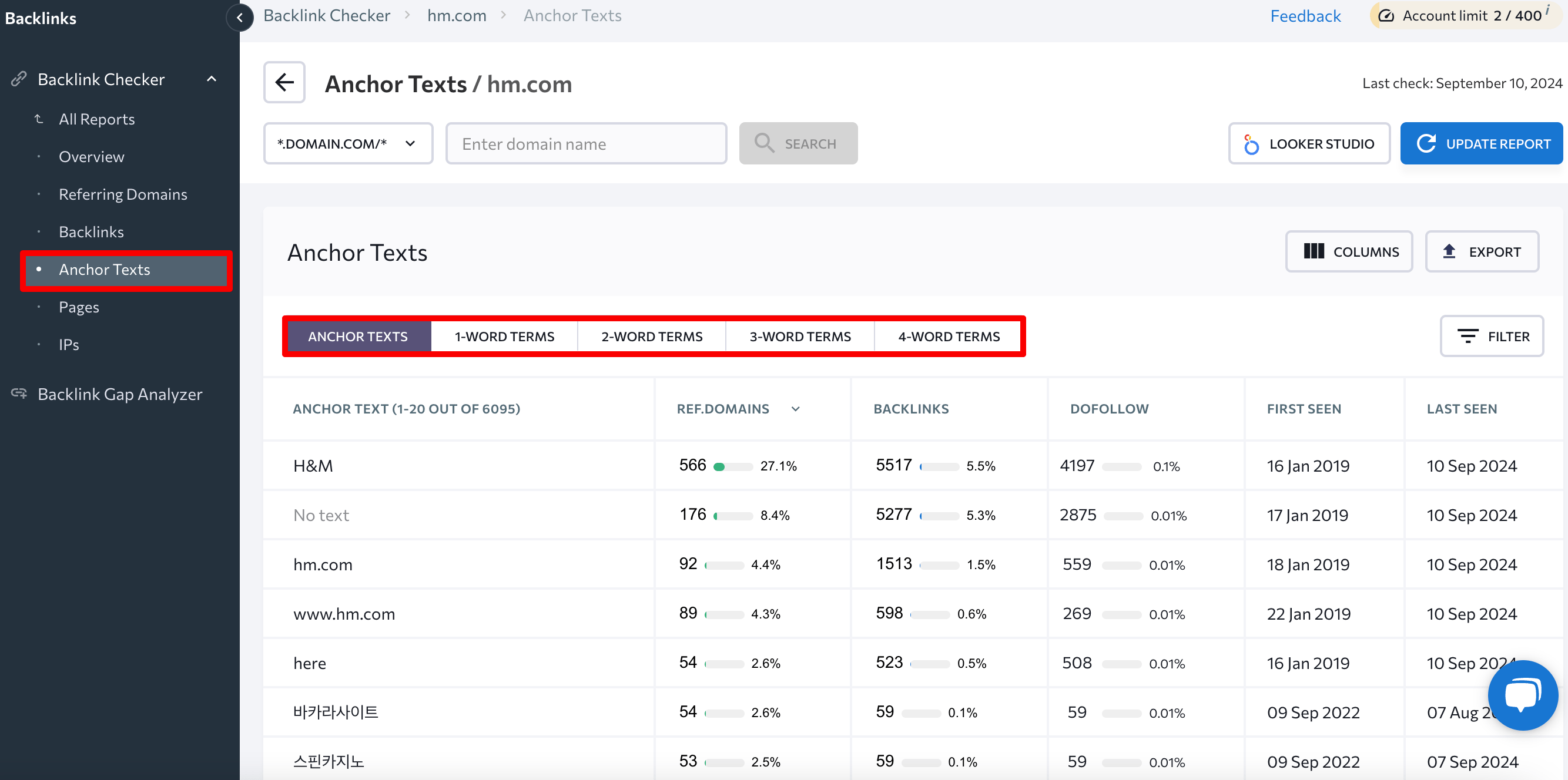
4. After scrolling down, you’ll see all your website’s anchor texts and their backlinks. For a deeper analysis, you can sort them by word count.
This tool also enables you to evaluate every anchor text based on multiple parameters, including:
- The number of referring domains with the same anchor text.
- The backlinks with their associated anchor text.
- The amount of dofollow backlinks that each specified anchor text has.
- The date when the backlink was first discovered and the date when the backlink was last analyzed by SE Ranking.
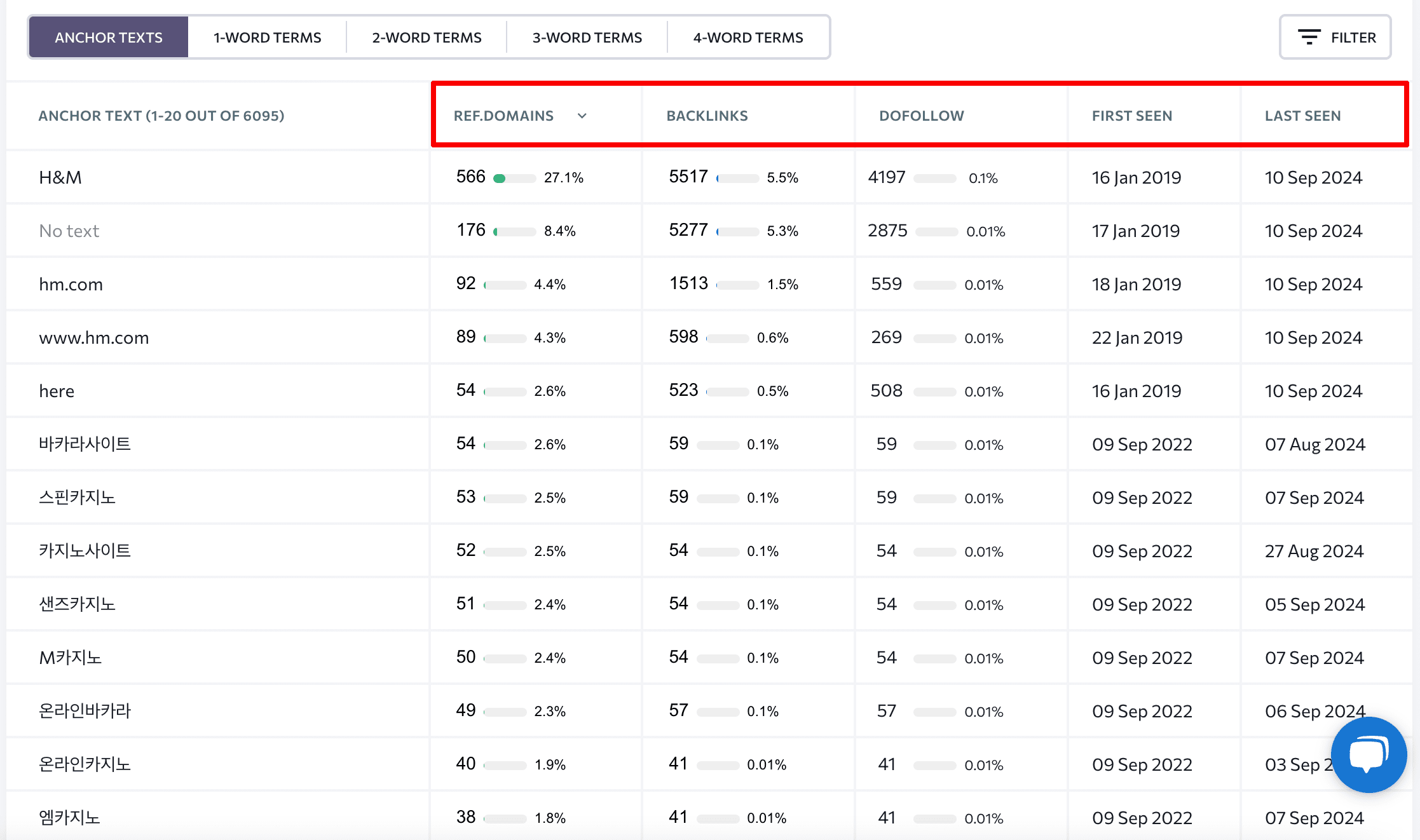
5. You can analyze any referring domain, the backlinks coming from it, and the actual text of the anchor by clicking the drop-down menu.
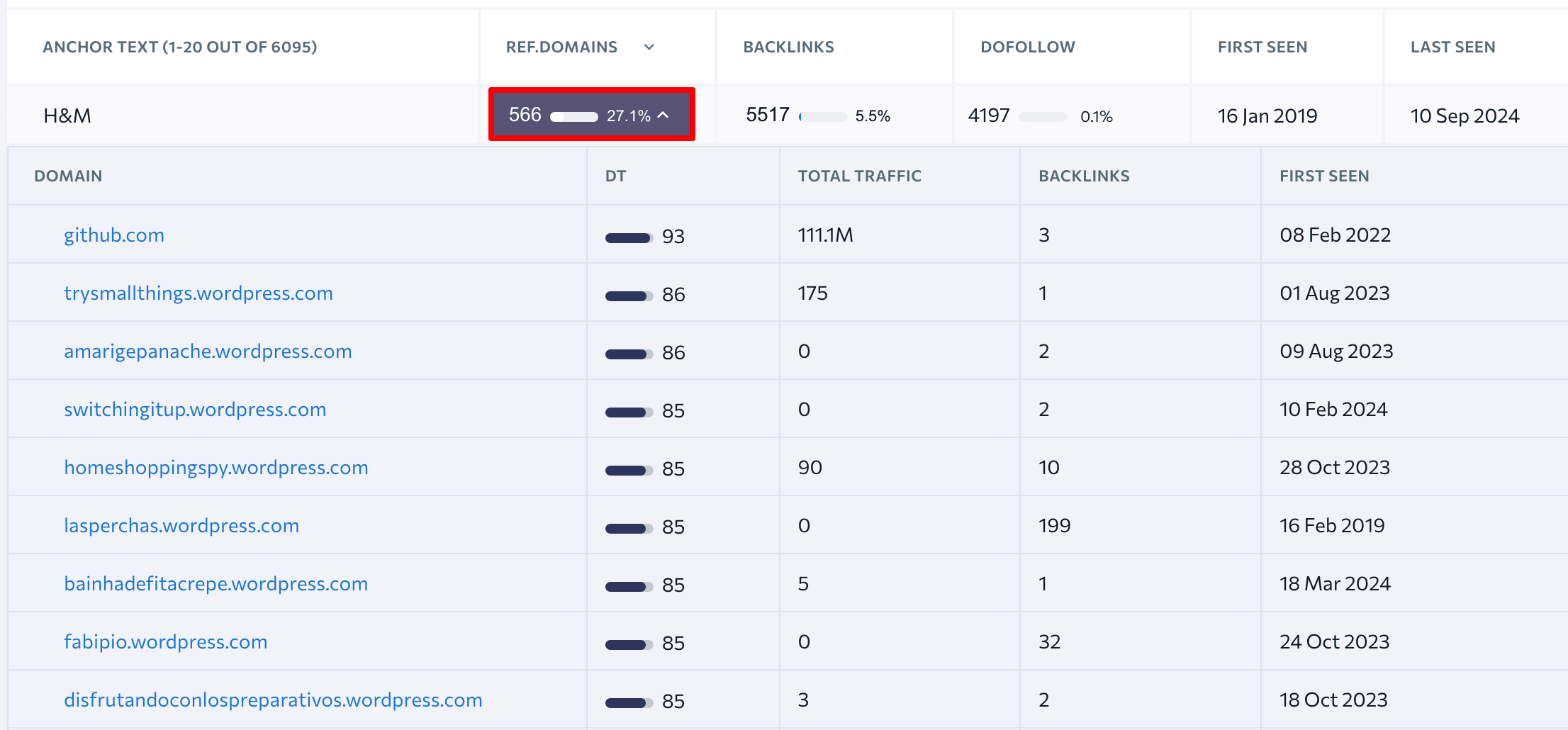
This tool is a super comprehensive tool. Not only does it help you find all of a backlink’s anchor texts but it also provides detailed information on each anchor. Here, you can conduct an in-depth analysis of anchor texts to work on them further and craft a well-thought-out link building strategy.
Now that we’ve covered how to find all your anchor texts in just a few clicks, let’s get on to the most important issue—how to create anchor texts that actually improve your website’s SEO.
How do you improve your anchor link texts?
As mentioned above, anchor texts should be given due consideration. Otherwise, your website may be penalized by Google, or you may not see the desired results from your tireless SEO efforts. To make anchor texts truly effective for your link building strategy, follow these three simple rules.
1. Make sure that your anchor text looks natural
Balance is the key to success. And link building is no exception. To avoid being penalized for spam, add some diversity to your anchor text strategy. Follow the two best practices below to naturalize your anchors for both search engines and users:
- Keyword-rich anchors, which have the most impact on search engine optimization, should make up no more than 10-30% of the total. Balance commercial anchor link texts with branded ones, naked, related keywords, etc. What a balanced anchor text list looks like depends on your niche.
- Create an anchor text plan to systemize your work with anchor texts and link building. You need a good plan to properly distribute different anchors between the following types of focus pages: homepage, product pages, blog posts, etc. For example, the ideal backlink ratio for the homepage might be 80%-95% brand, commercial and naked anchor texts. Develop your anchor text plan by taking a unique and varied approach that’s based on SERP analyses.
2. Make your anchor text relevant
Google pays special attention to relevance. If your anchor text isn’t relevant to the page of the website that your backlink leads to, or to the linking page itself, you risk being penalized by Google, which may consider the link spam.
To ensure your links are sending strong relevancy signals:
- Choose anchor text that provides at least a basic idea of what the page being linked to is about.
- Use keywords that are relevant to your page, but don’t over-stuff it.
- Avoid using lengthy or vague anchor text. Aim for short but descriptive text that consists only of a few words or a short phrase.
When reaching out to a site to offer your content or requesting a link to your mention on the external website, ask for specific anchor text.
3. Don’t trick your readers
We already discussed why anchor text relevance is important for search engines, but don’t forget about how important relevance is to users, too. Sure, users don’t directly impact your website’s rankings, but you need to please them not only because it’s the right thing to do but also for your own benefit. Remember— backlinks (with the anchors we are talking about) drive referral traffic to your website. Referral traffic could potentially turn into leads and eventually into clients.
This means you should do your best to attract visitors to your website by making them feel like they should be your customers. How can you do this with anchor texts?
Don’t make your anchors vague and misleading. Your visitors will be disappointed if they click on the anchor, text best SEO trends, only to be taken to a commercial landing page that offers your business’s SEO services. You should always be honest with your audience. Otherwise, you risk losing the trust of potential customers.
And, of course, make sure your link text is clickable and that it stands out from the rest of your content. Otherwise, visitors will be unaware of any link, and it may be considered cheating both the user and the search engine.
To understand your anchor text issues, you should regularly monitor backlinks. You can do it by using SE Ranking’s Backlink Monitor tool, which gives you a bird’s eye view of your current link building situation, which includes your anchor texts.
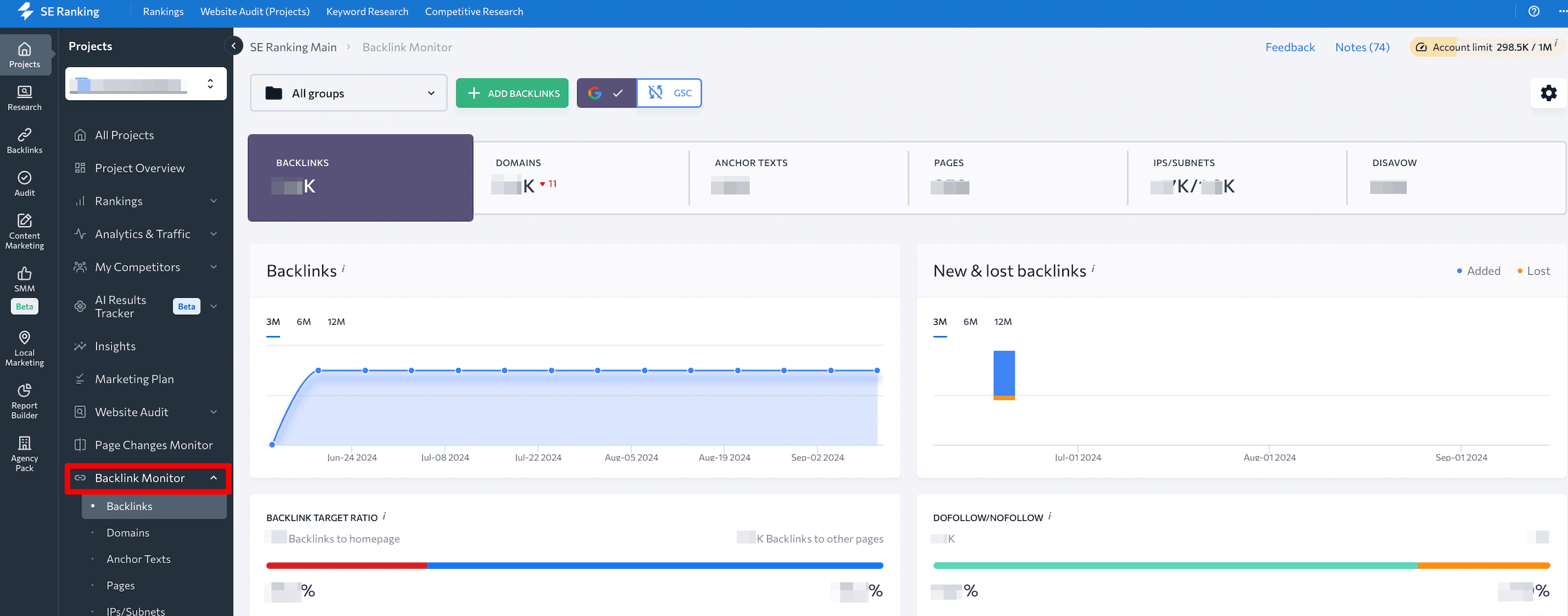
Here, you can add the backlinks you need (you can do this manually with SE Ranking’s Backlink Checker or by using Google Search Console) and monitor any changes in your anchors. For instance, let’s say the donor website changed the anchor text of a link leading to your page. This change may not be good for your link building strategy, but luckily you can track and deal with situations like these right away. Use the tools mentioned above to keep track of your results and analyze the effectiveness of each anchor text. They will help you understand how successful your current anchor strategy is and what you need to improve upon to gain better results.
Internal links and anchor texts
Anchor texts work well not only for backlinks but also for internal links. By using internal links, you create a network of connections between the different pages on your website. Using the right anchor texts within your website helps Google understand the relevance of your internal pages. It also creates an additional semantic core or even boosts the current semantic core for each page. Paying more attention to the anchor text used for internal links also helps users navigate your site better. The best part, however, is that you have complete control over the anchor texts used for internal linking.
Stick to the rules above about backlinks. Supplying your content with the most relevant and natural anchor texts that attract users to click and visit your pages will do you a world of good.
Don’t link for the sake of it. And, of course, avoid spam!
Wrapping up
Now you understand the importance of anchor text in SEO and its role in providing a positive visitor experience. You also understand how to use various link text types as well as how to avoid the most common mistakes.
Your next step is to put theory into practice. Let’s go over some of the main points we covered:
- Use keyword-rich anchor texts. These help focus pages rank for target keywords really fast. But don’t overload your content with a high percentage of keyword-rich anchor texts.
Once you come up with excellent anchor text ideas, don’t hesitate to share them in the comments section below the post!
